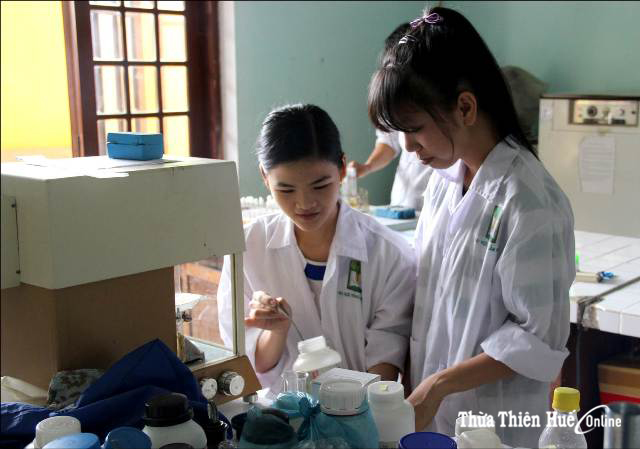
Students in the Faculty of Animal Science and Veterinary Medicine during the laboratory class
Towards students’quality
Assoc. Prof. Dr.Nguyen Xuan Ba, Dean of FASVM said that the idea of training students to order came from training concerns. Despite of the high rate of the faculty’sgraduate students having jobs, they are still limited in vocational and soft skills. Currently, there are many institutions training the same major; therefore, in order to keep the brand and compete against those ones, the faculty should pay attention to the quality of students, as well as meet the requirements of employers.
After discussions with many businesses, the FASVM’s idea has received the supports of GreenFeed Vietnam Joint Stock Company. The two units had many working sessions and came to the agreement on the training direction to order. There are 160 students in the first phase, divided into 4 classes. “These are the students who have obtained the basicknowledge and are entering their second and third years. The criteria for selecting students for these classes are voluntary enrollment, and the cut-off is determined by the scores of the previous academic year andthe interview by the company," Mr. Ba said.
Unlike the traditional training, order-oriented training is different in that the businesses join the faculty and university in training. According to Mr. Ba, the businesses have many experienced specialists. From the initial program, the faculty, the university and the businessesdiscuss to develop the curriculum framework towards improving and extending the modules to suit the actual jobs. The businesses’ experts directly talk to students, organize soft skills training courses, receive, guide students to do the internship in the businesses,and fully support the cost of internshipfor students. During the training process, the businesses and the faculty assess the quality of students, point out their strengths and weaknesses, as well as the remedial directions for them. "Students have about 5 months of internship in the businesses with modern facilities. This is a very great advantage," he added.
The training program is based on the binding trilateral relationship. The faculty and the university are responsible for student management and training. Students enrolling in this program are committed to working for the businesses at least 1 year after graduation. The businesses arecommitted to accompanying the university, partly supporting the cost of training, recruiting these students and paying them a two-level higher salary than those who were not trained under this program.
Luong Quang Danh, a student of Animal Science K50 shared: "Commitment to work at thecompany for one year is just enough for students to experience the knowledge and skills they learned and enough to recognize themselves whether they have the passion for their jobs and love the company, so as to keep working for it."
Should be multiplied
In the world, the order-oriented training model is very successful in Europe and in some Asian countries such as Korea, Singapore, Thailand. In Vietnam, this model has been initially adopted by many universities and has proved effective. Typically, the University of Transport Technology is coordinating with some Japanese businesses to train engineers with high qualification, who can capture the requirements of the businesses after graduation. In the academic year of 2016-2017, 20 graduated engineers work in Japan, earning about VND 50-60 million/month.
In Hue, this training direction is new. Training institutions have not deployed it because ofthe difficulties in connecting to businesses. The reasons for this come from two sides, partly due to the fact that universities are not really active. The rest is because the businesses in Hue are mainly small and medium, while this training model needs a very big companion by the businesses, especially the funds and commitment to ensuring students’ employment.
Mr. Ba said that to convince the businesses to coordinate in training, training institutions must prove that thistraining direction bring clear win-win benefits. According to him, it is difficult but still done by determination, in which connection to alumni is also a solution. The member colleges andfaculties in Hue University have many successful alumni who are the owners of businesses. They have to make use of this relationship to cooperate in the spirit of mutual benefits,aiming at effective methods and job creation for students after graduation.
Assoc. Prof. Dr. Le Van An, Rector of HUAF said that the training-to-order program brought many benefits and HUAF’s vieww as to facilitate faculties in connecting to businesses and multiply this training direction. The model of FASVM will be the premise for research and can be multiplied in other faculties.
Story and photo: Huu Phuc